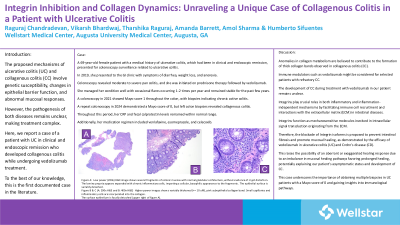Monday Poster Session
Category: IBD
P2707 - Integrin Inhibition and Collagen Dynamics: Unraveling a Unique Case of Collagenous Colitis in a Patient With Ulcerative Colitis
Monday, October 28, 2024
10:30 AM - 4:00 PM ET
Location: Exhibit Hall E

Has Audio

Raguraj Chandradevan, MBBS
Medical College of Georgia at Augusta University
Augusta, GA
Presenting Author(s)
Award: Presidential Poster Award
Raguraj Chandradevan, MBBS1, Vikarsh Bhardwaj, MBBS2, Tharshika Raguraj, MD3, Amanda Barrett, MD3, Amol Sharma, MS, MD, FACG1, Humberto Sifuentes, MD3
1Medical College of Georgia at Augusta University, Augusta, GA; 2Jawaharlal Nehru Medical College, New Dehli, Delhi, India; 3Augusta University, Augusta, GA
Introduction: The etiology of ulcerative colitis (UC) and collagenous colitis (CC) involves genetic predisposition, alterations in epithelial barrier function, and abnormal mucosal responses. Despite extensive research, the exact pathogenesis of both conditions remains elusive, complicating treatment strategies. Herein, we present a unique case of a patient initially diagnosed with UC, achieving clinical and endoscopic remission under vedolizumab therapy, who subsequently developed collagenous colitis—a novel occurrence yet to be reported in the medical literature.
Case Description/Methods: A 69-year-old female with a history of UC, previously in remission, underwent colonoscopy surveillance for UC. In 2019, she presented with symptoms including diarrhea, weight loss, and anorexia, revealing moderate to severe pancolitis. Prednisone followed by vedolizumab therapy was initiated, managing her condition effectively with sporadic flares occurring annually. In 2021, colonoscopy showed Mayo score 1 with biopsies indicating chronic active colitis (Figure 1). However, in 2024, despite a Mayo score of 0, biopsies revealed collagenous colitis (Figure 2). Throughout, her CRP and fecal calprotectin levels remained normal, and she was on venlafaxine, esomeprazole, and celecoxib.
Discussion: Collagenous colitis is characterized by thick collagen bands in the colon, possibly influenced by collagen metabolism anomalies, fibrogenic gene expression, and TGF beta 1. Medications like SNRIs, PPIs, and COX-2 inhibitors have been implicated as potential triggers, though no clear temporal relationship was observed. Conversely, vedolizumab, an immune modulator, may benefit refractory CC cases. Its mechanism involves integrin blockade, crucial for immune cell recruitment and ECM interactions, suggesting a role in preventing fibrosis and promoting mucosal healing. Therefore, the blockade of Integrin isoforms is proposed to prevent intestinal fibrosis and promote mucosal healing, as demonstrated by the efficacy of vedolizumab in ulcerative colitis (UC) and Crohn's disease (CD). This raises the possibility of an aberrant or exaggerated healing response due to an imbalance in mucosal healing pathways favoring prolonged healing, potentially explaining our patient's asymptomatic status and development of CC. This case underscores the importance of comprehensive biopsies in UC patients even with low Mayo scores, shedding light on immunological pathways involved.

Disclosures:
Raguraj Chandradevan, MBBS1, Vikarsh Bhardwaj, MBBS2, Tharshika Raguraj, MD3, Amanda Barrett, MD3, Amol Sharma, MS, MD, FACG1, Humberto Sifuentes, MD3. P2707 - Integrin Inhibition and Collagen Dynamics: Unraveling a Unique Case of Collagenous Colitis in a Patient With Ulcerative Colitis, ACG 2024 Annual Scientific Meeting Abstracts. Philadelphia, PA: American College of Gastroenterology.
Raguraj Chandradevan, MBBS1, Vikarsh Bhardwaj, MBBS2, Tharshika Raguraj, MD3, Amanda Barrett, MD3, Amol Sharma, MS, MD, FACG1, Humberto Sifuentes, MD3
1Medical College of Georgia at Augusta University, Augusta, GA; 2Jawaharlal Nehru Medical College, New Dehli, Delhi, India; 3Augusta University, Augusta, GA
Introduction: The etiology of ulcerative colitis (UC) and collagenous colitis (CC) involves genetic predisposition, alterations in epithelial barrier function, and abnormal mucosal responses. Despite extensive research, the exact pathogenesis of both conditions remains elusive, complicating treatment strategies. Herein, we present a unique case of a patient initially diagnosed with UC, achieving clinical and endoscopic remission under vedolizumab therapy, who subsequently developed collagenous colitis—a novel occurrence yet to be reported in the medical literature.
Case Description/Methods: A 69-year-old female with a history of UC, previously in remission, underwent colonoscopy surveillance for UC. In 2019, she presented with symptoms including diarrhea, weight loss, and anorexia, revealing moderate to severe pancolitis. Prednisone followed by vedolizumab therapy was initiated, managing her condition effectively with sporadic flares occurring annually. In 2021, colonoscopy showed Mayo score 1 with biopsies indicating chronic active colitis (Figure 1). However, in 2024, despite a Mayo score of 0, biopsies revealed collagenous colitis (Figure 2). Throughout, her CRP and fecal calprotectin levels remained normal, and she was on venlafaxine, esomeprazole, and celecoxib.
Discussion: Collagenous colitis is characterized by thick collagen bands in the colon, possibly influenced by collagen metabolism anomalies, fibrogenic gene expression, and TGF beta 1. Medications like SNRIs, PPIs, and COX-2 inhibitors have been implicated as potential triggers, though no clear temporal relationship was observed. Conversely, vedolizumab, an immune modulator, may benefit refractory CC cases. Its mechanism involves integrin blockade, crucial for immune cell recruitment and ECM interactions, suggesting a role in preventing fibrosis and promoting mucosal healing. Therefore, the blockade of Integrin isoforms is proposed to prevent intestinal fibrosis and promote mucosal healing, as demonstrated by the efficacy of vedolizumab in ulcerative colitis (UC) and Crohn's disease (CD). This raises the possibility of an aberrant or exaggerated healing response due to an imbalance in mucosal healing pathways favoring prolonged healing, potentially explaining our patient's asymptomatic status and development of CC. This case underscores the importance of comprehensive biopsies in UC patients even with low Mayo scores, shedding light on immunological pathways involved.

Figure: Figure A: Low power (200x) H&E image shows several fragments of colonic mucosa with normal glandular architecture, without evidence of crypt distortion. The lamina propria appears expanded with chronic inflammatory cells, imparting a cellular, basophilic appearance to the fragments. The epithelial surface is variably detached.
Figure B: 200x H&E and C: 400x H&E Higher power images show a variably thickened (>= 10 uM), pink subepithelial collagen band. Small capillaries and inflammatory cells are incorporated into the collagen. The surface epithelium is focally detached (upper right of figure B).
Figure B: 200x H&E and C: 400x H&E Higher power images show a variably thickened (>= 10 uM), pink subepithelial collagen band. Small capillaries and inflammatory cells are incorporated into the collagen. The surface epithelium is focally detached (upper right of figure B).
Disclosures:
Raguraj Chandradevan indicated no relevant financial relationships.
Vikarsh Bhardwaj indicated no relevant financial relationships.
Tharshika Raguraj indicated no relevant financial relationships.
Amanda Barrett indicated no relevant financial relationships.
Amol Sharma indicated no relevant financial relationships.
Humberto Sifuentes indicated no relevant financial relationships.
Raguraj Chandradevan, MBBS1, Vikarsh Bhardwaj, MBBS2, Tharshika Raguraj, MD3, Amanda Barrett, MD3, Amol Sharma, MS, MD, FACG1, Humberto Sifuentes, MD3. P2707 - Integrin Inhibition and Collagen Dynamics: Unraveling a Unique Case of Collagenous Colitis in a Patient With Ulcerative Colitis, ACG 2024 Annual Scientific Meeting Abstracts. Philadelphia, PA: American College of Gastroenterology.

